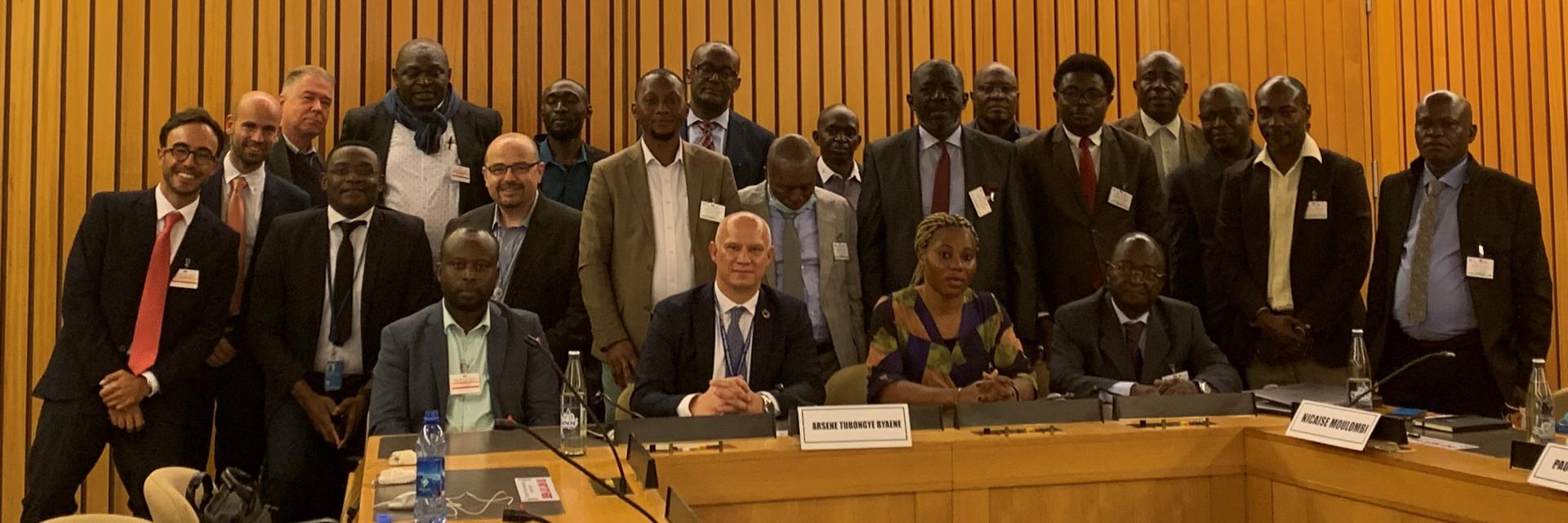Addis Ababa, 4 August 2022 (ECA) - The Economic Commission for Africa (ECA) hosted an expert group meeting to discuss the development of African carbon credit markets, in particular building on work that ECA has led to support the creation of a regional carbon registry and a harmonized protocol for issuance of carbon credits for countries of the Congo Basin Climate Commission.
The session formed part of the "African Roundtable on Initiatives to Accelerate Climate Action and Advance the SDGs" from 2-4 August 2022.
The Expert Group Meeting brought together experts from the Congo Basin Climate Commission to move forward with the project to establish as high integrity registry for the region. Speaking at the launch of the EGM, Executive Secretary Vera Songwe underlined that carbon markets would be an opportunity for African countries to leverage the true value of their natural capital and raise much needed resources for development and climate resilience. The current chair of the Congo Basin Climate Commission, H.E Arlette Soudan-Nonault, Minister of Environment, Sustainable Development and the Congo Basin of the Republic of Congo, thanked ECA for operationalizing the MoU signed at the 8th African Regional Forum on Sustainable Development, allowing the implementation of the proposed registry for the Cong Basin, and helping countries of the region to develop appropriate projects for financing.
The Roundtable session examined the importance of carbon markets in mobilizing private finance for Africa, how to create a high-integrity carbon market that is both efficient and transparent, how to understand the market mechanisms and ways to capture their value and retain it on the continent, as well as how to deal with aspects of the market that frustrate African players and where adjustments can be made to achieve success. Despite the increase in interest in carbon trading, as seen through the surge of offerings on international exchanges, Africa has not taken advantage of this rising momentum.
Participants were presented with projects seeking capital for low carbon technologies and those seeking to build high-integrity carbon registries for carbon sequestration. Thomas Sberna, Regional Head of Marine Coastal Resilience at the International Union for Conservation of Nature (IUCN), discussed the Blue Carbon Accelerator Fund (BCAF) and the Regional Restoration Hubs, two programs “that could conserve up to 40 00 hectares of mangroves and 10 000 hectares of seagrass and show the potential for blue carbon credits and carbon credit schemes under the Great Blue Wall Initiative. An initiative which aims to achieve 30% marine conserved area coverage by 2030 with a clear goal of establishing a connected network of nature and people positive seascapes.”
Chief of Green and Blue Economy at the ECA, Nassim Oulmane shared insights about the Conservation of Forests in the COMIFAC Area (Central Africa Forests Ministers Commission) project which covers countries of the Congo Basin. A project focusing on governance, local management, land rights and sustainability policies. The project aims to explore the scope for the implementation of a carbon credit scheme in 10 of the 17 countries in the Congo Basin.
Participants went on to discuss market opportunities in more detail. Executive Chair of the Egyptian Exchange, Mohamed Farid Saleh, highlighted the lack of Africa's presence as suppliers and market intermediaries in carbon market initiatives stating that: “to develop a proper carbon market, we cannot solely rely on trading for carbon markets we need to link the entire process from project development to financing. It must be a single, collaborative African platform as opposed to having a confined market for specific exchanges.”
Speaking about the need to develop high-quality carbon projects, Head of Carbon Markets Development at Standard Charted Bank, Chris Leeds said: "there is a great need for capacity building for governments so they can set up their infrastructures to approve high-quality carbon projects to enter the market." Leeds also highlighted the need for the development of skill sets and capabilities around the monitoring, reporting and verification of carbon credits in Africa. He went on to explain that in order to draw in mainstream finance there should be greater transparency around carbon projects so that financiers know their money is going where it is supposed to, and that it is shared equitably within the market and that it supports local communities.
In concluding the session, UK High-Level Climate Action Champion, Nigel Topping emphasized three critical aspects when developing carbon markets “we need integrity on the supply side and demand side, price stability and we need to get better at describing projects both technically and selling the story to draw in investors.”
Communications Section
Economic Commission for Africa
PO Box 3001
Addis Ababa
Ethiopia
Tel: +251 11 551 5826
E-mail: eca-info@un.org

